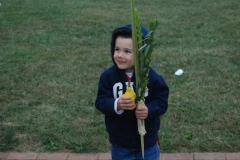
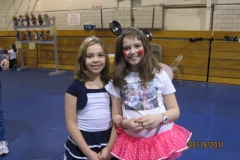
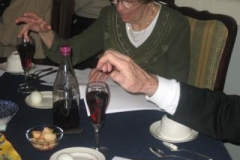
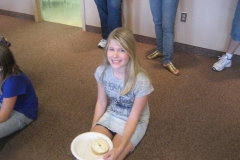
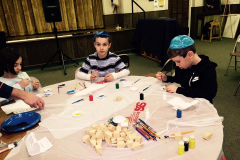


Usually, when I attend services with a family member or a friend, at some point they will turn to me and ask, will this be over soon? I always give the same response, We can only pray!
Unfortunately, this “prayer” often seems to be rarely answered in the manner desired by the questioner, or complainer. And it leads to questions that perhaps we should ponder, Does prayer really help? Why do I pray? What should I be praying for? The topic of prayer always reminds me of a story.
The humorist Harry Golden tells the story of his father, a notorious atheist who nevertheless went to synagogue every single Saturday morning. When Harry asked his father about it, his father replied, “Look, everyone goes to shul for a different reason. Garfinkel goes to synagogue to talk to God. I go to synagogue to talk to Garfinkel.”
I am sure that we all have different motivations for being here this morning. Perhaps some are here to pray that this may be a shorter service than past Shabbats. Perhaps, to pray for a Penn State win at the big game today. Perhaps, to make sure that we have a minyan to support Shelly who has made a great effort to prepare to read this week’s Torah portion and to support Joel who prepared to dazzle us with an excellent Haftorah. Our weekly bulletin was very focused on Shelly’s and Joel’s role in this special service. The bulletin explains they are celebrating special birthdays (Why so Special?) And they are sponsoring our kiddush today. I am guessing it was just an oversight, or expectations were low since there was no publicity for a special d’var Torah. And you may get what you pay for!
Back to the topic of prayer and what we call “going to services.” Over the last 18 months I have committed myself to be here every Shabbat that I am in town. Why? to support our congregation. As I have said before, I believe that it is our responsibility to keep the lights on so we can educate the few children we have left, remember those who have departed, celebrate lifecycle events, and maintain a Jewish presence in our little corner of the world. Judaism stands for justice, kindness, holiness and human dignity. Without a Jewish presence, our community is a lessor place for Jews and non-Jews.
That being said I not really big on the liturgy and I don’t enjoy all the prayers, but I do want to see what crazy ass socks Ron will be wearing. I would probably be more jazzed if I knew the prayers better, but I do get hyped when we bring the Torah out for a stroll, and I am inspired to hear the Torah reading, but I have no idea what is being said until I read the transliteration. Rabbis gets real fired about each reading and carefully explain with meticulous detail the nuances and special items in each Torah reading and each holiday readings. Sadly, it is often Just Hebrew to me. However, I have learned a lot over these last eighteen months, especially how to arrive just as the Torah service begins.
Even though my comprehension of Hebrew is poor, there is a certain delight and inspiration to sit here with my mind filled with the chants of Hebrew. I do find a degree of liberation in the chanting of prayers. It seems as if I can reflect, think and relax in a way that cannot happen in any other place or at any other time in my week. I feel better for having been here. I enjoy the peace and tranquility of no phones, texts, or lists. I am grateful for the break from reality of our busy world for two hours (not a minute more). I like to think of our minyan as a great mental break, a virtual oasis of tranquility, especially after the honors get sorted.
I suppose that is the purpose of Shabbat and I am grateful to all of you who make our weekly minyan possible.
I also want to talk a little bit about today’s parsha is called Chayei Sara, or the Life of Sarah, which begins with Sara’s death. We learn of Abraham’s grief and his purchase of a plot at the Cave of Machpelah to bury his wife. Abraham then dispatches his servant to find a wife for Isaac in Canaan from Abraham’s tribe. Rebecca meets the criteria for a wife and the next generation of Jews has been provided for, and as the parsha ends Abraham dies.
So two very important things happen, a Jewish cemetery is established and the passing of ethical monotheism to next generation is secured. To this day one of the first things every Jewish community does, is establish a cemetery, even before creating a house of worship.
While we acknowledge what has transpired in this parsha, the overriding message is the importance of l’dor v’dor, insuring the transmission of God’s message from generation to generation. A message that this world desperately needs and a message that has endured almost 6,000 years, despite “countless tragedies that would have devastated other nations beyond any hope of recovery as Rabbi Jonathan Sacks discusses in his weekly message. The destruction of the first Temple and the Babylonian exile. The destruction of the second Temple and the end of Jewish sovereignty. The expulsions, massacres, forced conversions and inquisitions of the Middle Ages, the pogroms of the 17th and 19th centuries, the Shoah and most recently the brutal and barbaric attack on Israeli citizens, including women, children and the elderly. Yet somehow the Jewish people mourned and wept, and then rose up and built the future. This is their unique strength and it came from Abraham, as we see in this week’s parsha.” Now this gift, this obligation, is in our hands to provide for the next generation.
There is a story told in the Talmud which we are all familiar, about a wise man named Honi, the Circle Drawer who one day came upon an elderly man planting a carob tree. Honi asked the man, “How long do you think it take for that tree to bear fruit?” The man replied, “Seventy years.”
Honi then asked the man, “And do you think you will live another seventy years to eat the fruit of this tree?” And the elder answered, “Perhaps not. However, when I was born, I found many carob trees planted by my father and grandfather. Just as they planted trees for me, I am planting trees for my children and grandchildren.
This story and this parsha is not about prayer, this is about action, this is about doing. I think we understand that prayer is not about asking for something, but a way to celebrate and be thankful, and provide strength for difficult tasks, and to provide comfort during adversity. Prayer reminds us of our responsibilities. It is import to articulate what needs to be done, but it is more important to get it done.
We can pray for peace as we do each week with Desi’s leadership, and we can pray for Israel in this great time of challenge, but most of us in this room have opted more importantly to do something to help, you have given to our Federation Emergency Relief Campaign to Stand With Israel and provide funds for humanitarian purposes. I am proud that 46 family units in our community have given over $41,000 to this cause and with the Federation match we have given over $61,000. Every gift of any size is significant and I thank you very much. With Federations across North America, Jewish communities have raise over 550 million dollars.
The money says a lot and does a lot but more importantly, when you make a gift it really says we support each other and we stand together, as Judaism was intended to be, as a community.
There are other ways to act beyond prayer:
On Tuesday there will be a march in Washington, DC to show support for Israel, demand freedom of hostages and to march against antisemitism.
On Thursday evening here in Altoona, there is the annual interfaith Thanksgiving Service. This year the focus will be on tikkun olam and the crisis in Israel. Federation representatives have worked with the interfaith planning committee to include support of Israel in this program. The interfaith committee has been very accommodating and It would be a shame if we did not represent ourselves and our community as a way of saying thank you for their support. Sacred Heart Church 7pm, corner of 20th street and 6th avenue. Be there.
We live in challenging times. From Israel, to Ukraine, to the threats to democracy and the rule of law, to the increased, open and brazen antisemitism, life for Jews has become much more difficult. It is critical that we take action to support the people, the programs, and the communities that ensure freedom of religion and worship. It is incumbent that prayer lead to action if you value human rights and human dignity.
It is important to remember that we do have the power to work for change and work for justice. Sure, cruelty and injustice make as sad and distraught, but it shouldn’t make us feel helpless or powerless.
We do not have to be victims. We can attend causes and events that celebrate diversity, promote equality, justice and democracy. There are limitless ways to be involved in organizations that look to achieve these goals. We can write letters to the editor of our local paper and lobby our elected officials. We can educate our family and friends. We are not helpless or powerless. But we must act
In conclusion, yes, your prayers have been answered, I would like to read one of my favorite passages from our High Holiday machzor from Rabbi Menachem Mendel Schneerson:
“If you see what needs to be repaired and how to repair it, then you have found a piece of the world that God has left for you to complete. But if you only see what is wrong and what is ugly in the world, then it is you yourself that needs repair.”
Shabbat Shalom.
Powered by WordPress